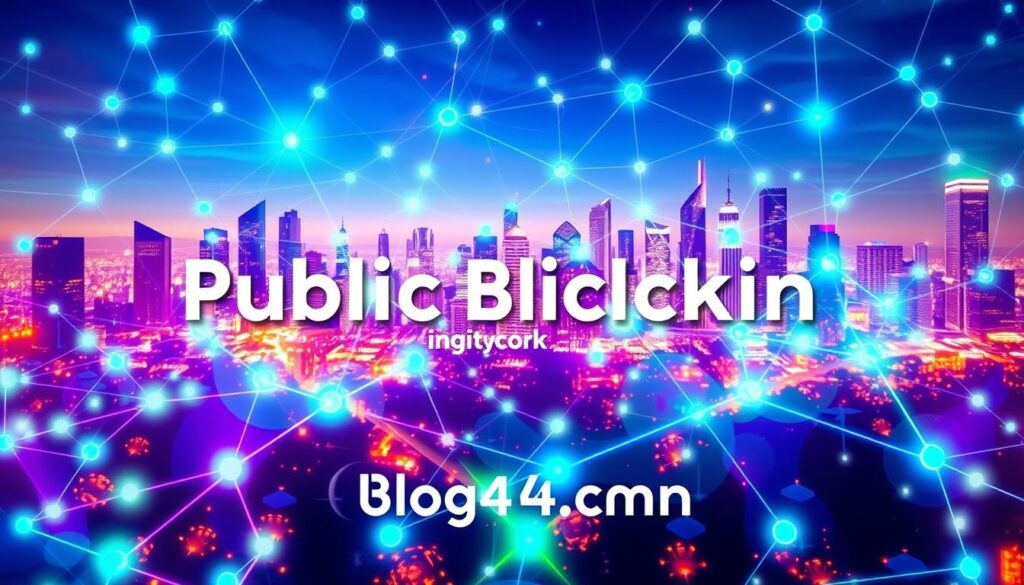The world of digital technology has seen a big change with blockchain. This decentralized ledger is changing industries all over the world1. It’s making things better by being more scalable and energy-efficient. It also brings unmatched transparency, security, and efficiency1.
Key Takeaways
- Blockchain is a decentralized digital ledger that records data in chronological blocks.
- It ensures transparency and immutability, making it ideal for secure and trustless systems.
- Key components of blockchain include data, hash, and previous hash in each block.
- Blockchain technology is transforming industries by making them more secure, efficient, and transparent.
- Public, private, and consortium blockchains are chosen based on use cases, with examples like Ethereum and Hyperledger.
What is Blockchain Technology?
Blockchain is a digital ledger that records transactions across many computers in a network2. It was first introduced in 2008 by Satoshi Nakamoto2. Unlike traditional databases, blockchain uses peer-to-peer networks, cryptography, and consensus to keep data secure.
Definition of Blockchain
Blockchain is a digital ledger that grows continuously. It links blocks of transactions with cryptography2. Each block is connected to the last one, making it tamper-proof. This makes blockchain a secure way to track and validate information.
Key Components of Blockchain
The main parts of a blockchain network are:
- The blockchain network itself, which can be public, private, or consortium-based
- The consensus mechanism, such as Proof of Work or Proof of Stake, that ensures the validity of transactions
- Smart contracts, which are self-executing agreements that facilitate, verify, and enforce the negotiation or performance of a contract
- Blockchain development tools, like Solidity and the Truffle Suite, that enable the creation and deployment of decentralized applications
- Blockchain nodes, which are the individual computers or devices that validate and store the transaction data
These parts work together to create a secure, transparent, and decentralized platform. It’s used for financial transactions, supply chain management, and more2. Blockchain’s distributed nature eliminates the need for a central authority, making transactions more efficient2.
“Blockchain technology has the power to change how we store and transfer value and information.”
– Don Tapscott, author of “Blockchain Revolution”
The History of Blockchain Development
Blockchain technology started with early ideas of secure digital chains3. It grew from digital currency ideas, with Bitcoin’s launch in 2009 being a big step4.
Early Concepts and Innovations
Blockchain has been around for over a decade. It began with cryptography and distributed computing4. It evolved into a secure, open digital ledger system, thanks to many researchers and developers3.
The Birth of Bitcoin
Bitcoin was introduced in 2009 by Satoshi Nakamoto4. It was the first popular cryptocurrency. It used blockchain’s key features for secure, peer-to-peer transactions without a central authority3.
The Bitcoin network helped make blockchain well-known4. Its success led to many other cryptocurrencies and applications. These use blockchain’s unique features, showing its wide range of possibilities3.
| Key Blockchain Milestones | Year |
|---|---|
| Blockchain concept first proposed | 2008 |
| Bitcoin, the first blockchain-based cryptocurrency, launched | 2009 |
| Ethereum, a decentralized platform for building and running distributed applications, launched | 2015 |
| Blockchain technology adopted by various industries, including finance, supply chain, healthcare, and more | 2016-present |

Blockchain’s journey has been incredible, with new ideas and applications3. It’s changing how we do digital transactions and manage data. It’s even changing our society4.
How Blockchain Works
Blockchain technology uses a network of nodes to validate and store data. These nodes keep a secure, open, and unchangeable digital ledger of transactions5. Knowing how blockchain works is key to using it fully.
The Role of Nodes in Blockchain
At the core of blockchain are network nodes. They are divided into full nodes and lightweight nodes5. Full nodes have the whole blockchain, keeping the transaction history safe. Lightweight nodes only have the latest blocks, asking for older ones when needed.
This setup makes the network strong and able to grow.
Consensus Mechanisms Explained
Blockchain networks use consensus to agree on transactions5. Two main algorithms are Proof of Work and Proof of Stake. Bitcoin uses Proof of Work, where miners solve hard math problems to validate transactions.
Ethereum, on the other hand, uses Proof of Stake. This method lets validators with more cryptocurrency have more say in the network.
Cryptographic Security Features
Blockchain’s security comes from cryptography5. It uses hashing and digital signatures to keep data safe. Hashing turns data into a fixed, unique output. Digital signatures prove a transaction’s authenticity.
Understanding blockchain’s details, from nodes to cryptography, reveals its full power65.
Types of Blockchains
Blockchain technology has many types, each with its own features and uses. The choice of blockchain depends on what you need for your project7.
Public vs. Private Blockchains
Public blockchains, like Ethereum, are open to everyone with internet. They are transparent, secure, and support decentralized solutions78. They are big and strong, but might have security and privacy issues7.
Private blockchains are controlled by one person or group. They are great for things like supply chain and accounting because they are fast and secure7. But, they are not as open as public blockchains and might not be as good for everyone7.
Consortium and Hybrid Blockchains
Consortium blockchains are run by many groups working together. They are good for businesses because they are secure and can be changed for different needs7. But, they can also be hacked like other blockchains7.
Hybrid blockchains mix public and private parts. They are flexible and can be used in many ways, fitting different needs7.
| Blockchain Type | Key Characteristics | Example |
|---|---|---|
| Public Blockchain | Open, transparent, secure, decentralized | Ethereum |
| Private Blockchain | Controlled by a single entity, efficient, customizable | Hyperledger Fabric |
| Consortium Blockchain | Managed by multiple organizations, permissioned, customizable | R3 Corda |
| Hybrid Blockchain | Combines elements of public and private networks, flexible | IBM Blockchain Platform |

“The choice of blockchain depends on the specific needs and requirements of the use case.”
Choosing a blockchain depends on your goals. Public, private, consortium, or hybrid blockchains each have strengths and weaknesses. Knowing these can help you pick the best one for your needs78.
Blockchain Use Cases
Blockchain technology is changing many industries. It’s making financial services, supply chain management, and healthcare better. The global blockchain market is expected to hit $163 billion by 20279. More businesses are seeing the great benefits of using blockchain.
Financial Services and Transactions
In finance, blockchain makes transactions faster and safer. It cuts out the middlemen10. This means cross-border payments can go from days to minutes10, saving money10.
Banks use blockchain to make processes like KYC easier. It also helps with regulatory reports and compliance10. Smart contracts on blockchain can enforce agreements without needing third parties10.
Supply Chain Management Solutions
Blockchain is changing supply chain management11. The market for blockchain in this area is growing fast, from $2.08 billion in 2024 to $9.77 billion by 203011. It’s all about better traceability and transparency11.
Companies like Maersk and Walmart are using blockchain. They track shipping containers and food products. This reduces paperwork and makes supply chains more efficient11.
Healthcare Applications
In healthcare, blockchain is a secure way to manage patient data9. It makes it easy for different systems to work together9. This helps with sharing data and working together9.
Blockchain also keeps patient data safe. Only those who should see it can access it9. This is key for keeping patient information secure9.
As blockchain use grows, more businesses are seeing its value. It’s helping in finance, supply chain, and healthcare. Blockchain’s flexibility is changing these important areas for the better.
Advantages of Blockchain Technology
Blockchain is changing the game in many fields12. It brings transparency, accuracy, and accountability to finance12. It also helps avoid future financial problems by keeping track of assets securely12.
Enhanced Security Features
Blockchain’s design makes it secure and trustworthy13. It doesn’t rely on one central point, making it hard to hack or censor13. It uses advanced cryptography to keep data safe and true13.
Greater Transparency and Traceability
Blockchain lets everyone see transaction history while keeping personal info private13. Once a transaction is on the blockchain, it’s hard to change13. This makes it perfect for tracking goods and money.
Reduced Costs and Efficiency Improvements
12 Blockchain can cut costs and boost security12. It makes processes smoother and saves money by cutting out middlemen12.

Using blockchain, companies can boost security and efficiency1213. This leads to more trust, lower costs, and better results for everyone1213.
Challenges Facing Blockchain Adoption
The blockchain revolution is growing, but it faces big challenges for widespread use. One major issue is scalability. Blockchain is secure and transparent, but it’s slower than traditional systems. This slows down big businesses a lot14.
Another big problem is the lack of regulatory clarity and compliance. Blockchain’s decentralized nature makes it hard for old rules to apply. This makes businesses hesitant to use it because of worries about following the rules14. With 6.8% of the world using crypto and over 560 million owners, clear rules are key for more acceptance15.
Scalability Issues
Scalability is a big challenge for blockchain. The crypto market is growing fast, but blockchain is slow. This is a big problem for big businesses that need fast transactions14.
Regulatory and Compliance Concerns
Blockchain’s decentralized nature makes regulatory compliance hard. With 6.8% of the world using crypto and over 560 million owners, clear rules are needed. But, different places have different rules, making it hard for businesses to know what to do15.
| Challenge | Description |
|---|---|
| Complexity and Learning Curve | Blockchain technology involves numerous protocols, consensus methods, and coding languages, leading to challenges in team training and adaptation for many firms14. |
| Scalability Problem | Transaction processing and speed in blockchain systems are slower compared to traditional systems, specially impacting large enterprises14. |
| Interoperability Issues | Differing protocols across blockchain platforms hinder seamless data exchange, necessitating solutions for better integration14. |
| Regulatory and Compliance Headaches | Blockchain’s decentralization poses challenges to traditional regulatory frameworks, leading to reluctance in full adoption by businesses due to compliance concerns14. |
| Costs and Investment Risks | Setting up and maintaining blockchain infrastructure can be prohibitively costly for smaller enterprises, highlighting the need for cost-effective solutions and assessing the return on investment14. |
“Blockchain technology’s decentralized nature poses significant challenges when it comes to regulatory compliance, leading to reluctance among businesses to fully embrace this emerging technology.”
As blockchain keeps growing, solving these challenges is key. It will unlock blockchain’s full power and help it be used more widely across different fields.
The Future of Blockchain Technology
Blockchain technology is growing fast, with new trends and predictions showing its huge promise. It’s getting better at handling more transactions and working with new tech. This means big changes for businesses and industries worldwide.
Emerging Trends in Blockchain
Scalability solutions are key in blockchain’s future. New tech like Layer 2 protocols and sharding make networks faster and more efficient16. These improvements, along with blockchain’s integration with AI, IoT, and 5G, will boost adoption and innovation16.
Interoperability and standardization are also big trends. As blockchain grows, linking different networks and systems smoothly is vital16. Leaders and policymakers are working on standards to make this easier, aiming for a more connected blockchain future.
Predictions for Blockchain Adoption
Experts predict blockchain will be used more in many industries16. Trends like DeFi growth in 2025 and decentralized healthcare in 2027 will drive this adoption16.
Blockchain’s impact on healthcare, supply chains, government, real estate, and education will be huge16. The rules around blockchain will also change, with governments setting clearer guidelines and international standards16.
The future of blockchain is full of possibilities. As it grows, we’ll see big changes in how we work and interact online1617.

Blockchain Beyond Cryptocurrency
Blockchain is growing beyond just cryptocurrencies. Smart contracts are a big leap forward. They are digital agreements that work on their own, without middlemen18. Built on platforms like Ethereum, they can change many fields by making things faster, clearer, and cheaper.
Smart Contracts Explained
Smart contracts do things automatically when certain things happen. This means less chance for mistakes or slow downs. They use blockchain’s secure ledger to handle deals and data safely and openly18.
They help in many areas like supply chains, property, insurance, and voting. They make things more efficient, cut down on fraud, and keep things honest.
Decentralized Finance (DeFi) Innovations
Blockchain has also led to Decentralized Finance (DeFi). It’s a new way to do banking without big banks18. DeFi uses smart contracts for lending, trading, and making stablecoins. It gives people more control and clearness over their money18.
This new way could make banking better for everyone. It could make it easier to get into and fairer for all.
Blockchain is changing the world in many ways, not just with money. It’s about smart contracts and DeFi too. The future is looking bright with blockchain’s power to change industries, make things clear, and spark new ideas1819.
Blockchain in Different Industries
Blockchain technology is changing many industries, not just finance. It’s making real estate deals faster, improving gaming, and keeping education records safe. It’s also making supply chains more efficient. Let’s see how blockchain is changing the future of different fields.
Real Estate Transformations
Blockchain is changing real estate in places like Sweden and the UAE. It’s making deals faster and cutting down on paperwork20. Now, people can own a piece of property without buying the whole thing. This makes real estate more accessible and liquid.
Impact on the Gaming Sector
In gaming, blockchain lets players own digital items and collectibles. By 2024, it had changed the entertainment industry, letting creators sell directly to fans20. This means gamers can trade and sell their digital goods, opening up new ways to make money.
Education and Credential Verification
Blockchain is helping in education by making it easier to verify diplomas. Schools like the University of Bahrain and MIT are using it20. It helps students prove their qualifications to employers, making hiring easier and safer.
Blockchain is also changing healthcare, supply chains, and more2021. As it grows, we’ll see even more ways it can change our world.

Blockchain and Data Privacy
In today’s world, data privacy is a big concern. Blockchain technology is a promising answer. It lets users control their personal info better, meeting rules like the GDPR22.
Understanding Data Privacy Regulations
Data privacy laws are getting tougher. Companies must protect sensitive info. The GDPR lets people see, change, and delete their data. Blockchain fits well with these rules, letting users control their data and consent23.
How Blockchain Enhances Privacy
Blockchain’s main features are transparency and immutability. This makes it great for keeping data safe. It stores data in a way that’s hard to change, keeping personal info secure and trackable22.
Blockchain is getting better fast. Soon, it will solve privacy and scaling issues. This will help companies use blockchain safely and securely, opening up new ways to use data22.
Blockchain is a game-changer for data privacy. It gives users power and meets legal standards. As blockchain grows, companies need to keep up to use its privacy benefits.
The Role of Blockchain in Sustainability
Businesses and consumers are now more aware of their environmental impact. Blockchain technology is key in making things greener. It offers new ways for everyone to help the planet24.
Environmental Benefits of Blockchain
Blockchain makes supply chains more transparent. This helps businesses and consumers make better choices and avoid greenwashing24. It also tracks carbon emissions, helping companies reduce their impact on the environment24.
Blockchain lets people buy renewable energy directly, cutting down on fossil fuels. It makes energy more accessible and boosts the use of clean energy24. It also helps manage waste by proving recycling, supporting a circular economy24.
Sustainable Supply Chains
Blockchain is changing supply chains for the better. IBM Food Trust uses it to track food, reducing waste and promoting fair products24. Power Ledger in Australia and India lets people trade energy, promoting renewables24. The Plastic Bank rewards recycling, fighting ocean pollution and helping communities24.
But blockchain isn’t without its challenges. It uses a lot of energy and can be hard to integrate. Yet, new, energy-saving models are emerging, and rules are being made to help2425.
Blockchain is a game-changer for sustainability. It helps us make better choices and be more transparent. As it grows, it will be key to a greener future26.

Education and Resources on Blockchain
Blockchain technology is changing many industries. This has led to a big need for learning resources. Whether you’re new to blockchain or want to learn more, there are many ways to get started.
Recommended Books and Courses
Many books and online courses can teach you a lot about blockchain. Books like “Blockchain Basics” by Daniel Drescher and “Blockchain Revolution” by Don Tapscott offer deep insights. They cover blockchain’s history, how it works, and its uses in the world27.
Online courses on Udemy, Coursera, and Udacity are also popular. They teach everything from the basics to advanced skills. Experts teach these courses, and you can get a certificate when you finish28.
Online Communities and Forums
The blockchain community is active online. Sites like Reddit’s r/blockchain and Bitcointalk.org are great for learning and talking with others. You can ask questions and keep up with new things28.
YouTube channels like Ivan on Tech are also key for learning. With nearly 70,000 subscribers, they offer content for all levels. You can find easy explanations and detailed technical talks28.
Exploring these educational resources can open up the world of blockchain. It’s a chance to see how it can change industries and help people. Whether you’re a student, professional, or just curious, there’s a lot to learn.
Blockchain Myths Debunked
Blockchain technology has become very popular in recent years. But, many myths have also come up. It’s time to clear up these common blockchain myths and show its real power.
Common Misconceptions
Many think blockchain is only for Bitcoin29. But, blockchain is used in many areas, not just for digital money. It’s great for keeping data safe and moving it around in fields like supply chains and healthcare.
Some believe blockchain uses a lot of energy and harms the environment29. But, newer blockchain versions use less energy. This makes blockchain better for our planet.
Clarifying Blockchain’s True Potential
Blockchain is more than just for digital money29. It’s changing how we do business and share information. It’s making things more secure and open.
People used to think blockchain was completely private30. But, now we can track blockchain activities. This helps fight crime. Even though some digital coins keep your info private, blockchain’s openness is helping a lot.
As blockchain grows, we need to know what’s real and what’s not29. By understanding its true value, we can make things better in many areas. This will lead to a safer, more open, and efficient world.

Getting Started with Blockchain Technology
The blockchain market is growing fast, with a 87.7 percent growth rate from 2023 to 2030. It’s expected to reach $1,431.54 billion31. If you’re interested in blockchain, learning about integration and tools is a great start.
Learning About Blockchain Integration
Start by learning the basics of blockchain integration. Understand concepts like decentralized networks, consensus mechanisms, and smart contracts32. Knowing how blockchain works helps you see its uses in different fields.
Tools and Platforms for Beginners
There are many tools and platforms for blockchain beginners. Ethereum is known for its smart contract support and dApp creation32. The Truffle Suite is another great tool for blockchain app development31. These resources can help you start your blockchain journey.
Blockchain development jobs are expected to grow by 25 percent by 203231. Blockchain developers in the US earn an average of $102,242 a year, according to Glassdoor31. Learning blockchain skills can be both rewarding and profitable.
The blockchain world is always changing. It’s important to keep up with new trends and tools. Use online resources, join communities, and try projects to stay ahead in this exciting field313332.
Conclusion: Embrace the Blockchain Revolution
The blockchain revolution is changing how we do business. It brings better security, transparency, and efficiency34. From Bitcoin’s start in 2009 to today, blockchain is making a big impact3435.
Recap of Key Insights
This guide has covered the basics of blockchain and its growth. It’s changing finance, healthcare, and supply chains34. Its unique system and security features make it a big deal in the digital world34.
Encouraging Future Exploration
As the blockchain revolution grows, keep up with new innovations and future trends34. By diving into blockchain, you and your team can lead in digital change. This opens up new chances and fuels innovation for the future3435.
FAQ
What is blockchain technology?
Blockchain is a digital ledger that records data in blocks. It’s decentralized, ensuring data is transparent and unchangeable. This makes it perfect for secure systems. It’s changing industries by making things more secure, efficient, and transparent.
How does blockchain work?
Blockchain uses a network of nodes to validate and store data. It uses consensus mechanisms like Proof of Work to agree on the ledger’s state. Cryptographic security, like hashing and digital signatures, keeps transactions safe and authentic.
What are the different types of blockchains?
There are public, private, consortium, and hybrid blockchains. Public blockchains, like Ethereum, are open to everyone. Private blockchains, like Hyperledger Fabric, are restricted. The choice depends on the need for transparency and control.
What are the key advantages of blockchain technology?
Blockchain boosts security with encryption, offers transparent records, and automates processes. This reduces costs and builds trust in various systems and transactions.
What are the main challenges in blockchain adoption?
Scalability is a big challenge, as public blockchains struggle with speed and capacity. Regulatory hurdles and compliance with laws like GDPR also pose challenges for widespread use.
What are the emerging trends in blockchain technology?
New trends include better scalability, energy-efficient consensus, and integration with AI and IoT. Experts predict wider adoption, focusing on interoperability and standardization.
How can blockchain be used beyond cryptocurrency?
Smart contracts on platforms like Ethereum automate agreements. Decentralized Finance (DeFi) uses blockchain to recreate traditional finance, without central authorities. This offers services like lending and trading.
How does blockchain address data privacy concerns?
Blockchain gives users control over their data, meeting GDPR standards. It enhances data security and privacy with its cryptographic features.
What are some common blockchain myths and misconceptions?
Myths include blockchain being only for cryptocurrencies and concerns about energy use. Clearing these misconceptions shows blockchain’s wide range of uses.
How can I get started with blockchain technology?
Start by learning about integration and choosing tools. Platforms like Ethereum and development tools like Truffle Suite help beginners develop blockchain applications.


















